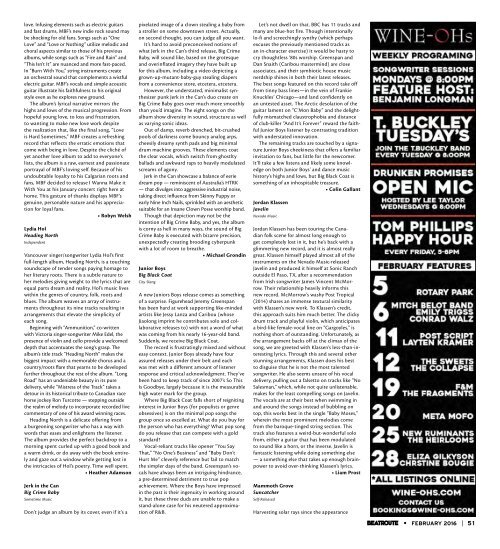BeatRoute Magazine Alberta print e-edition - Feb. 2016
BeatRoute Magazine is a monthly arts and entertainment paper based in Western Canada with a predominant focus on music – local, independent or otherwise.
BeatRoute Magazine is a monthly arts and entertainment paper based in Western Canada with a predominant focus on music – local, independent or otherwise.
Create successful ePaper yourself
Turn your PDF publications into a flip-book with our unique Google optimized e-Paper software.
love. Infusing elements such as electric guitars<br />
and fast drums, MBF’s new indie rock sound may<br />
be shocking for old fans. Songs such as “One<br />
Love” and “Love or Nothing” utilize melodic and<br />
choral aspects similar to those of his previous<br />
albums, while songs such as “Fire and Rain” and<br />
“This Isn’t It” are nuanced and more fast-paced.<br />
In “Burn With You,” string instruments create<br />
an orchestral sound that complements a wistful<br />
electric guitar. MBF’s vocals and simple acoustic<br />
guitar illustrate his faithfulness to his original<br />
style even as he explores new ground.<br />
The album’s lyrical narrative mirrors the<br />
highs and lows of the musical progression. From<br />
hopeful young love, to loss and frustration,<br />
to wanting to make new love work despite<br />
the realization that, like the final song, “Love<br />
is Hard Sometimes,” MBF creates a refreshing<br />
record that reflects the erratic emotions that<br />
come with being in love. Despite the cliché of<br />
yet another love album to add to everyone’s<br />
lists, the album is a raw, earnest and passionate<br />
portrayal of MBF’s loving self. Because of his<br />
undoubtable loyalty to his Calgarian roots and<br />
fans, MBF decided to release I Wanna Make it<br />
With You at his January concert right here at<br />
home. This gesture of thanks displays MBF’s<br />
genuine, personable nature and his appreciation<br />
for loyal fans.<br />
• Robyn Welsh<br />
Lydia Hol<br />
Heading North<br />
Independent<br />
Vancouver singer/songwriter Lydia Hol’s first<br />
full-length album, Heading North, is a touching<br />
soundscape of tender songs paying homage to<br />
her literary roots. There is a subtle nature to<br />
her melodies giving weight to the lyrics that are<br />
equal parts dream and reality. Hol’s music lives<br />
within the genres of country, folk, roots and<br />
blues. The album weaves an array of instruments<br />
throughout its nine tracks resulting in<br />
arrangements that elevate the simplicity of<br />
each song.<br />
Beginning with “Ammunition,” co-written<br />
with Victoria singer-songwriter Mike Edel, the<br />
presence of violin and cello provide a welcomed<br />
depth that accentuates the song’s grasp. The<br />
album’s title track “Heading North” makes the<br />
biggest impact with a memorable chorus and a<br />
country/roots flare that yearns to be developed<br />
further throughout the rest of the album. “Long<br />
Road” has an undeniable beauty in its pure<br />
delivery, while “Mistress of the Track” takes a<br />
detour in its historical tribute to Canadian race<br />
horse jockey Ron Turcotte — stepping outside<br />
the realm of melody to incorporate recorded live<br />
commentary of one of his award winning races.<br />
Heading North is a delicate offering from<br />
a burgeoning songwriter who has a way with<br />
words that eases and enlightens the listener.<br />
The album provides the perfect backdrop to a<br />
morning spent curled up with a good book and<br />
a warm drink, or do away with the book entirely<br />
and gaze out a window while getting lost in<br />
the intricacies of Hol’s poetry. Time well spent.<br />
• Heather Adamson<br />
Jerk in the Can<br />
Big Crime Baby<br />
Sometime Music<br />
Don’t judge an album by its cover, even if it’s a<br />
pixelated image of a clown stealing a baby from<br />
a stroller on some downtown street. Actually,<br />
on second thought, you can judge all you want.<br />
It’s hard to avoid preconceived notions of<br />
what Jerk in the Can’s third release, Big Crime<br />
Baby, will sound like, based on the grotesque<br />
and overinflated imagery they have built up<br />
for this album, including a video depicting a<br />
grown-up-mutant-baby-guy stealing diapers<br />
from a convenience store, etcetera, etcetera.<br />
However, the understated, minimalist synthesizer<br />
punk Jerk in the Can’s duo create on<br />
Big Crime Baby goes over much more smoothly<br />
than you’d imagine. The eight songs on the<br />
album show diversity in sound, structure as well<br />
as varying sonic ideas.<br />
Out of damp, reverb drenched, bit-crushed<br />
pools of darkness come bouncy analog arps,<br />
cheesily dreamy synth pads and big minimal<br />
drum machine grooves. These elements coat<br />
the clear vocals, which switch from ghostlty<br />
ballads and awkward raps to heavily modulated<br />
screams of agony.<br />
Jerk in the Can showcase a balance of eerie<br />
dream pop — reminiscent of Australia’s HTRK<br />
— that divulges into aggressive industrial noise,<br />
taking direct influence from Skinny Puppy or<br />
early Nine Inch Nails, sprinkled with an aesthetic<br />
suitable for an Insane Clown Posse worship band.<br />
Though that depiction may not be the<br />
intention of Big Crime Baby, and yes, the album<br />
is corny as hell in many ways, the sound of Big<br />
Crime Baby is executed with bizarre precision,<br />
unexpectedly creating brooding cyberpunk<br />
with a lot of room to breathe.<br />
• Michael Grondin<br />
Junior Boys<br />
Big Black Coat<br />
City Slang<br />
A new Juniors Boys release comes as something<br />
of a surprise. Figurehead Jeremy Greenspan<br />
has been hard at work supporting like-minded<br />
artists like Jessy Lanza and Caribou (whose<br />
Jiaolong im<strong>print</strong> he contributes solo and collaborative<br />
releases to) with not a word of what<br />
was coming from his nearly 16-year-old band.<br />
Suddenly, we receive Big Black Coat.<br />
The record is frustratingly mixed and without<br />
easy context. Junior Boys already have four<br />
assured releases under their belt and each<br />
was met with a different amount of listener<br />
response and critical acknowledgment. They’ve<br />
been hard to keep track of since 2007’s So This<br />
Is Goodbye, largely because it is the measurable<br />
high water mark for the group.<br />
Where Big Black Coat falls short of reigniting<br />
interest in Junior Boys (for populists or genre<br />
obsessives) is on the minimal pop songs the<br />
group once so excelled at. What do you buy for<br />
the person who has everything? What pop song<br />
do you release that can compete with a gold<br />
standard?<br />
Vocal-reliant tracks like opener “You Say<br />
That,” “No One’s Business” and “Baby Don’t<br />
Hurt Me” cleverly reference but fail to match<br />
the simpler days of the band. Greenspan’s vocals<br />
have always been an intriguing hindrance,<br />
a pre-determined detriment to true pop<br />
achievement. Where the Boys have impressed<br />
in the past is their ingenuity in working around<br />
it, but these three duds are unable to make a<br />
stand-alone case for his neutered approximation<br />
of R&B.<br />
Let’s not dwell on that. BBC has 11 tracks and<br />
many are blue-hot fire. Though intentionally<br />
lo-fi and screechingly synthy (which perhaps<br />
excuses the previously mentioned tracks as<br />
an in-character exercise) it would be hasty to<br />
cry thoughtless ‘80s worship. Greenspan and<br />
Dan Snaith (Caribou mastermind) are close<br />
associates, and their symbiotic house music<br />
nerdship shines in both their latest releases.<br />
The best songs featured on this record take off<br />
from tinny bass lines—in the vein of Frankie<br />
Knuckles’ Chicago—and land confidently on<br />
an untested asset. The Arctic desolation of the<br />
guitar lament on “C’Mon Baby” and the delightfully<br />
mismatched claustrophobia and distance<br />
of club-killer “And It’s Forever” reward the faithful<br />
Junior Boys listener by contrasting tradition<br />
with understated innovation.<br />
The remaining tracks are touched by a signature<br />
Junior Boys cheekiness that offers a familiar<br />
invitation to fans, but little for the newcomer.<br />
It’ll take a few listens and likely some knowledge<br />
on both Junior Boys’ and dance music<br />
history’s highs and lows, but Big Black Coat is<br />
something of an inhospitable treasure.<br />
• Colin Gallant<br />
Jordan Klassen<br />
Javelin<br />
Nevado Music<br />
Jordan Klassen has been touring the Canadian<br />
folk scene for almost long enough to<br />
get completely lost in it, but he’s back with a<br />
glimmering new record, and it is almost really<br />
great. Klassen himself played almost all of the<br />
instruments on the Nevado Music-released<br />
Javelin and produced it himself at Sonic Ranch<br />
outside El Paso, TX, after a recommendation<br />
from Irish songwriter James Vincent McMorrow.<br />
Their relationship heavily informs this<br />
new record. McMorrow’s washy Post Tropical<br />
(2014) shares an immense textural similarity<br />
with Klassen’s new work. To Klassen’s credit,<br />
this approach suits him much better. The clicky<br />
drum track and playful violin, which anticipates<br />
a bird-like female-vocal line on “Gargoyles,” is<br />
nothing short of outstanding. Unfortunately, as<br />
the arrangement backs off at the climax of the<br />
song, we are greeted with Klassen’s less-than-interesting<br />
lyrics. Through this and several other<br />
stunning arrangements, Klassen does his best<br />
to disguise that he is not the most talented<br />
songwriter. He also seems unsure of his vocal<br />
delivery, pulling out a falsetto on tracks like “No<br />
Salesman,” which, while not quite unlistenable,<br />
makes for the least compelling songs on Javelin.<br />
The vocals are at their best when swimming in<br />
and around the songs instead of bubbling on<br />
top, this works best in the single “Baby Moses,”<br />
wherein the most prominent melodies come<br />
from the baroque-tinged string section. This<br />
track also features a weird-but-wonderful solo<br />
from, either a guitar that has been modulated<br />
to sound like a horn, or the inverse. Javelin is<br />
fantastic listening while doing something else<br />
— a something else that takes up enough brainpower<br />
to avoid over-thinking Klassen’s lyrics.<br />
• Liam Prost<br />
Mammoth Grove<br />
Suncatcher<br />
Self-Released<br />
Harvesting solar rays since the appearance<br />
BEATROUTE • FEBRUARY <strong>2016</strong> | 51


















